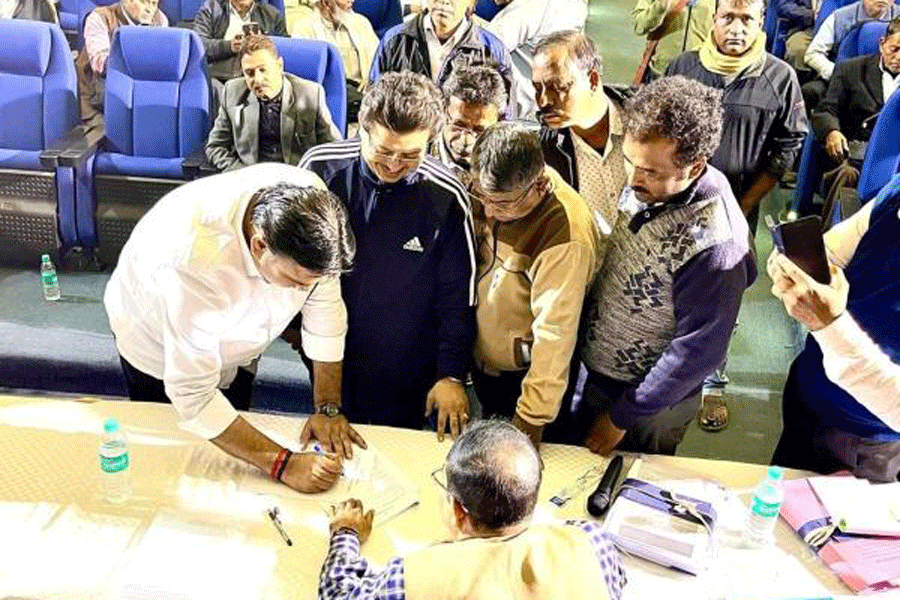The Bengal government on Wednesday raised the minimum daily wage of jute labourers at the entry level to Rs 485 from the existing Rs 370 and offered multiple financial benefits by signing a tripartite agreement with the jute industry representatives and labour unions.
The tripartite agreement, to improve the wages and other financial benefits of some three lakh jute workers in Bengal, would come into effect from February 4, 2024, state labour welfare minister Moloy Ghatak said on Thursday. The pact will be effective for the next three years.
The last such pact was signed in 2019.
The revision in the jute industry wages comes ahead of a scheduled visit by Union textile minister Piyush Goyal to Calcutta later this week. Industry sources said the Union minister was expected to take stock of the developments in the jute sector, including concerns such as falling raw jute prices.
Both labour unions and jute mill owners have welcomed the new agreement, but at the same time expressed concern over the promotion of synthetics by the Centre, the main consumer of jute products.
After the previous agreement expired in early 2023, labour unions sought from the state government a wage hike and other benefits.
According to the pact, a worker would draw a gross monthly wage of Rs 14,066 at the entry level, which is a hike of about Rs 3,562 a month. A senior labourer would draw a grossly monthly wage of Rs 17,271, Rs 553 more than his previous wage. Employees hired in 2002 will draw a monthly wage of Rs 15,837, a hike of Rs 627.
Moreover, all existing labourers will get a one-time ad hoc amount of Rs 130 per month, which will be added to the basic wages, apart from DA.
The industry representatives unanimously agreed to hike house rent allowance to 7.5 per cent from 5 per cent.
Among the other major benefits, a new worker will be paid an attendance incentive of Rs 20 daily for at least 12 out of 15 days of uninterrupted attendance. Also, labourers working for 20 or more years will be made “permanent”, which stands to benefit around one lakh workers.
In a bid to resolve the PF grievances of labourers, the government and jute mill owners agreed to dissolve the Provident Fund Trustee Boards and PF accounts of all jute mills and brought them under the control of the Centre’s EFPO.
Representatives of the Indian Jute Mills Association (IMJA), 113 individual jute mill owners not associated with the IMJA, and 23 labour unions, along with INTTUC, signed the pact in Ghatak's presence.
The IMJA welcomed the pact but also pointed out the added expense with the wage hike.
“The new wage agreement comes into effect from February 4. We anticipate a 5 per cent rise in wage bills because of it. It will raise operating costs and we have to see how best to manage at a time when there are demand constraints,” Raghavendra Gupta, the IMJA chairperson told The Telegraph. "But we are committed to worker welfare.”
Labour department officials said jute mill owners agreed to divide workers into unskilled, semi-skilled, skilled and highly skilled categories.
In another new initiative, the retirement age for women workers in the jute sector in Bengal has been unanimously raised to 58 years from 55 years.
Terming the agreement “historic”, Trinamul leader and state INTTUC president Ritabrata Banerjee said: “The agreement is a unique example of inclusiveness as demands of all unions have been considered with respect and unlike previous years, Left-backed unions also joined the meeting and signed the agreement”.
Nabendu Dasgupta, Bengal chapter president of the AICCTU-affiliated Bengal Chatkal Mazdoor Forum, said: “The new agreement has come as a ray of hope for jute mill labourers.”
“The entire process of employment and wage division has been largely streamlined by reducing the gaps,” Dasgupta further added.
“Moreover, it (the agreement) has looked into the retirement benefits, ensuring the clearance of all dues within the stipulated 30 days. Now it depends on the jute mill industry and government on how it implements the decisions in real-time situations. We will urge the government to ensure the implementation without delay,” he said.










